Research line
Automatic Control

The AUTOMATIC CONTROL line develops basic and applied research in
automatic control, with special emphasis on modelling,
control and supervision of nonlinear, complex and/or large-scale
systems.
The group has acquired specific expertise in the application of
advanced control techniques to environmental resources management,
specifically in the water and energy fields.
Head of line: Maria Serra Prat

Research areas
>> Modelling and control of complex nonlinear systems.
>> Modelling and control of large-scale networked systems.
>> Design and implementation of decision-support tools for resources management systems with multiple, heterogeneous constraints.
>> Real-time supervisory control, fault diagnosis and fault-tolerance.
>> Applied research
Tech. transfer
Our activity finds applications in several fields through collaboration with our technological partners.
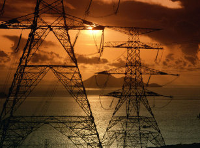
Research projects
We carry out projects from the European Framework Programme and others national and international
research programmes.
→ More about our research projects
<< Back to Automatic Control main page
Modelling and control of complex nonlinear systems
In order to design controllers for complex nonlinear systems, it is fundamental to have mathematical models of the systems' dynamic behaviour. Regarding dynamic modelling of complex nonlinear systems, the Control Group focuses on four subjects: models for multidomain systems using PHS formulation; distributed parameter models and their order reduction; experimental characterisation techniques combining the use of time and frequency responses of the dynamic system, conceived as diagnosis tools; the design of observers to be integrated in the control systems in order to improve the system performance and minimise the number of sensors. Regarding control system design, the work is based on the following advanced control techniques: passivity-based control, Optimal Control, Model Predictive Control, Variable Structure Control (VSC) and Linear Parameter Varying (LPV)-Robust Control.
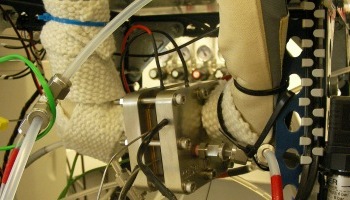
Modelling and control of large-scale networked systems
In automation, it is more and more frequent to deal with large scale networked systems which are composed by a multitude of elements of diverse dynamical nature. Obtaining a mathematical model oriented to the management and control of such systems should take into account their real time operation and complex topology. Moreover, complementary considerations such as physical constraints, hybrid behaviour and bounded disturbances are also challenging topics in the study of this kind of systems.
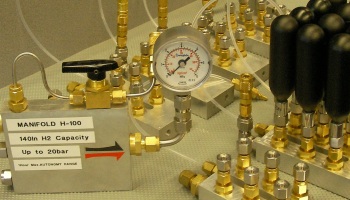
Design and implementation of decision-support tools for resources management systems with multiple, heterogeneous constraints
A large variety of real-time resource allocation problems dealing with long- and medium-term resources management typically appear in public services and industry. Some examples are water management (both surface and pipeline systems), energy generation and distribution, and environmental planning. The operation of these systems requires dealing with multiple, heterogeneous constraints. Not just physical constraints are to be met, but also those imposed by regulations, operational practices, economy, ecology, etc. The overall aim is to step away from the classical trial-and-error-based simulation approach and create real problem-solving tools for optimal management of large-scale resources management problems.
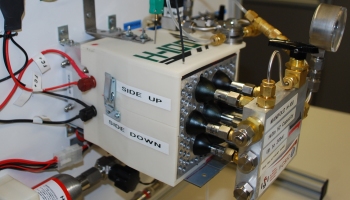
Real-time Supervisory Control, Fault Diagnosis and Fault-Tolerance
Reliability is a feature required in modern control systems which implies the introduction of fault diagnosis and fault tolerant control modules that allow to know in real-time if there is any non-desired behaviour (fault) and activate some remedial action in order to keep the system in operation (fault tolerance). Complementary aspects as sensor/actuator location for achieving the desired fault diagnosis and tolerance are also addressed.
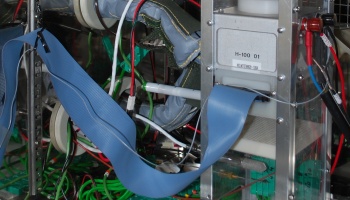
Applied Research
Theoretical knowledge is applied in real cases, in close collaboration with industry. Currently, research is mainly focused on four fields: modelling and control of systems based on Proton Exchange Membrane Fuel Cells based systems; modelling, control and management of electrical networks; design of optimal operational management of networked systems related to the urban water cycle and sensor data validation/reconstruction of instrumentation systems. The Control Group gives primary importance to the tasks of implementation and experimental validation of the proposed control and modelling methodologies. These final stages of the control design process are developed either in the industry or at the Institute's Laboratories: the Fuel Cells Laboratory and the Water Cycle Control Systems Lab.
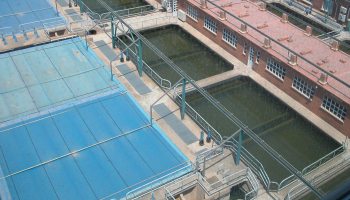
These are the latest research projects of the Automatic Control research line:
-

INN-BALANCE: Innovative cost improvements for balance of plant components of automotive PEMFC systems
European Project
Start Date: 01/01/2017
-

INCITE: Innovative controls for renewable sources integration into smart energy systems
European Project
Start Date: 01/12/2015
-

EFFIDRAIN: Efficient integrated real-time control in urban drainage and wastewater treatment plants for environmental protection
European Project
Start Date: 01/10/2015
-

GRACeFUL: Global systems Rapid Assessment tools through Constraint FUnctional Languages
European Project
Start Date: 01/02/2015
-

PUMA MIND: Physical bottom Up multiscale Modelling for Automotive PEMFC Innovative performance and Durability optimization
European Project
Start Date: 17/12/2012
-

EFFINET: EFFicient Integrated real-time monitoring and control of drinking water NETworks
European Project
Start Date: 01/10/2012
-

ACOFC: Advanced Controllers and Observers Development for Fuel Cell based Generation Systems
European Project
Start Date: 01/06/2011
-

ACRES: Advanced control of renewable energy generation systems based on fuel cells/wind power
European Project
Start Date: 07/05/2012
-

CLOCWiSe: Constraint logic for operational control of water systems
European Project
Start Date: 01/01/1996
-

MAFALDA: Manufacture, automation and integration of vanadium redox flow batteries in renewable energy systems
National Project
Start Date: 01/01/2022
-

MASHED: Efficient Management of Energy Systems including Hybrid Electrochemical Energy Storage using Digitalisation Technologies
National Project
Start Date: 01/12/2022
-

L-BEST: Supervision and fault-tolerant control of smart infrastructures based on advanced learning and optimization
National Project
Start Date: 01/09/2021
-

DOVELAR: Control and energy management of hybrid fuel cell-based electric vehicles
National Project
Start Date: 01/01/2019
-

MICAPEM: Parameter estimation, diagnosis and control for the improvement of efficiency and durability of PEM fuel cells
National Project
Start Date: 01/01/2016
-

DEOCS: Monitorización, diagnostico y control tolerante a fallos de sistemas ciberfísicos con métodos basados en datos
National Project
Start Date: 30/12/2016
-

ECOCIS: EConomic Operation of Critical Infrastructure Systems
National Project
Start Date: 01/01/2014
-

MESPEM: Desarrollo de sistemas de control para la mejora de la eficiencia y la vida útil en sistemas basados en pilas de combustible PEM
National Project
Start Date: 01/01/2012
-
WATMAN: Analysis and Design of distributed optimal control strategies applied to large-scale WATer systems MANagement
National Project
Start Date: 01/01/2010
-

DISCPICO: Design and implementation of control systems for PEM fuel cells and their integration into distributed electrical power generation systems
National Project
Start Date: 01/01/2011
-

AECI: Control avanzado y desarrollo de nuevos sistemas híbridos de generación de energía eléctrica basados en pilas de combustible tipo PEM
National Project
Start Date: 17/01/2010
-

DICOPEM: Avances en el modelo y diseño de controladores para sistemas basados en pila de combustible PEM
National Project
Start Date: 01/10/2007
-

ITACA: Integración de técnicas avanzadas de modelado, control y supervisión aplicadas a la gestión del ciclo integral del agua
National Project
Start Date: 01/10/2006
-

CONPEM: Diseño de controladores para el proceso electroquímico en pilas de combustible de tipo PEM
National Project
Start Date: 01/01/2005
-

ITECOTOF: Desarrollo e Integración de Técnicas de Control Tolerante a Fallos de Procesos Complejos
National Project
Start Date: 01/01/2003
-

TCNL: Análisis comparativo de técnicas avanzadas de control no lineal. Aplicaciones a sistemas de generación de energía eléctrica y a manipuladores mecánico
National Project
Start Date: 01/01/1995
-

FUSAGUA: Fusión sensorial para la monitorización en tiempo real de fugas en redes de distribución de agua
CSIC Project
Start Date: 15/02/2025
-

CHEERFUL: Analysis and design of controllers for high-pressure electrolyzers applied to obtaining hydrogen for a PEM fuel-cells setup
CSIC Project
Start Date: 01/02/2018
-

MuYSCA: Modelado y control de sistemas de riego en canal abierto
CSIC Project
Start Date: 01/04/2019
-

DEOCBI: Ayudas extraordinarias para la preparación de proyectos 2019 - relacionada con proyecto DPI2016-76493-C3-3R DEOCS
CSIC Project
Start Date: 01/01/2020
-

MACPERCON: Enhanced management topologies based on unfalsified control for PEM fuel cells performance improvement
CSIC Project
Start Date: 01/01/2012
-

NEURON: Aprendizaje neuronal en la robótica. Aplicaciones a la minería
CSIC Project
Start Date: 01/09/1997
-

REFER: Reducció energètica i flexibilitat en edificis en rehabilitació
Regional Project
Start Date: 01/06/2016
-

DiaPEM : Polymer Electrolyte Membrane Fuel Cell Stack Diagnosis System
Regional Project
Start Date: 12/05/2015
-

Hy-BCN: Study and development of a high efficient HYdrogen storage system Based on solid oxide Cells and reNewable energy sources
UPC Project
Start Date: 27/12/2019
-

TWINs: Digital Twin: Realizing Resilient Operation of Critical Infrastructures
UPC Project
Start Date: 01/10/2019
-

PLIO: Desarrollo de herramientas planificación integral operativa de redes de agua potable
UPC Project
Start Date: 01/03/2003
-

CORAL: Control Optimizado de Redes de Alcantarillado
Technology Transfer Contract
Start Date: 01/03/2000
-

NODELAB II: Acuerdo para la realización de una prueba de concepto sobre metodología y conocimiento de detección de fugas (segunda fase)
Technology Transfer Contract
Start Date: 15/02/2024
-

CETAQUA: Contribució a la promoció i supervisió de projectes de recerca de l'àmbit de les xarxes de distribució d'aigua
Technology Transfer Contract
Start Date: 01/06/2007
-

TOFMAN: Towards the future smart manufacturing systems
Technology Transfer Contract
Start Date: 01/09/2020
-

NODELAB: Acuerdo para la realización de una prueba de concepto sobre metodología y conocimiento de detección de fugas
Technology Transfer Contract
Start Date: 23/06/2021
-

IKERCON: Control avanzado de procesos complejos de manufactura
Technology Transfer Contract
Start Date: 01/09/2016
-

CETAQUA: RCT1201 Ph2-Optimal and predictive RTC module interfaced to SWIP
Technology Transfer Contract
Start Date: 23/05/2014
-

STOP-IT: Strategic, Tactical, Operational Protection of water Infrastructure against cyber-physical Threats
Technology Transfer Contract
Start Date: 12/04/2018
-

ModCon: Modelado y control de redes de alcantarillado: aplicación en Bogotá (Colombia)
Technology Transfer Contract
Start Date: 04/09/2015
-

SITEL: R+D consistents en el desenvolupament d'una "Llibreria de càlcul de repartiment de càrregues elèctriques en tecnologia.NET"
Technology Transfer Contract
Start Date: 25/02/2013
-

ELISSA-CRISALIDA: Supervisory Algorithms for Safe and Efficient Energy Distribution
Technology Transfer Contract
Start Date: 01/06/2007
-

CLABSA: Optimum control of urban drainage systems. implementation of an integrated tool for the global optimised control of a combined sewer network
Technology Transfer Contract
Start Date: 02/10/2006
-

LEAR: Desenvolupament d'un algorisme de gestió de l'energia elèctrica en un vehicle híbrid sèrie amb arquitectura de doble bus
Technology Transfer Contract
Start Date: 05/05/2006
-

CONDEP1: Regulación del depósito de tormentas de la estación regeneradora de aguas residuales de La China, Madrid
Technology Transfer Contract
Start Date: 01/12/2005
-

ADASA: Contribución a la mejora de la gestión de alarmas hidráulicas del sistema de información de sectores en la red de agua de Barcelona
Technology Transfer Contract
Start Date: 01/06/2004
-

COMPaSs: Constraints for optimized management and naintenance of pipeline systems
European Project
Start Date: 01/12/1999
-

WATERNET: Knowledge capture of advanced supervision of water distribution networks
Technology Transfer Contract
Start Date: 01/01/1996
-

MARINE: Application of fuel cells for auxiliary power systems in marine environment
Regional Project
Start Date: 14/03/2005
-

GERHYCO: Gestión, simulación y predicción de la evolución de los recursos de redes hidrográficas en períodos críticos
Regional Project
Start Date: 01/01/2001
-

RiverBank: Constraint logic for river bank design; a pre-investigation delf hydraulics
UPC Project
Start Date: 01/01/1999
These are the most recent publications (2025 - 2024) of the Automatic Control
-
P. Segovia, V. Puig, R. Negenborn and V. Reppa. Dynamic coordination of multiple movable bridges and vessels for time-efficient inland waterway navigation. IEEE Transactions on Intelligent Transportation Systems, 2025, to appear.
 Abstract
Abstract
 Info
Info
 PDF
PDF
-
S. Zhang, V. Puig and S. Ifqir. Set-membership estimation of switched LPV systems: Application to fault/disturbance estimation. International Journal of Robust and Nonlinear Control, 34(7): 4509-4531, 2024.
 Abstract
Abstract
 Info
Info
 PDF
PDF
-
P. Cardona. Optimization-based control of renewable hydrogen production, storage and dispatchment systems for the transport sector, 2024 IRI Doctoral Day, 2024, Barcelona, pp. 2.
 Abstract
Abstract
 Info
Info
 PDF
PDF
-
M. Sheikhsamad and V. Puig. Learning-based control of autonomous vehicles using an adaptive neuro-fuzzy inference system and the linear matrix inequality approach . Sensors, 24(8): 2551, 2024.
 Abstract
Abstract
 Info
Info
 PDF
PDF
-
A. Luque, D. Parent, A. Colomé, C. Ocampo-Martínez and C. Torras. Model predictive control for dynamic cloth manipulation: Parameter learning and experimental validation. IEEE Transactions on Control Systems Technology, 32(4): 1254-1270, 2024.
 Abstract
Abstract
 Info
Info
 PDF
PDF
-
T.P. Puleston, G. Marini, A. Trovò, M. Serra, R. Costa and M. Guarnieri. Optimised partial remixing procedure for mitigating capacity loss in imbalanced vanadium flow batteries, 2024 International Flow Battery Forum, 2024, Glasgow, UK, pp. 90-91.
 Abstract
Abstract
 Info
Info
 PDF
PDF
-
J.Y. Colín-Castillo, G.L. Osorio-Gordillo, V. Puig, R.A. Vargas-Méndez, G.V. Guerrero-Ramírez, J. Reyes-Reyes and C. Astorga-Zaragoza. Sensor fault detection for LPV systems using interval observers. IEEE Access, 12: 93701-93710, 2024.
 Abstract
Abstract
 Info
Info
 PDF
PDF
-
A. Molavi, M. Serra and A.P. Husar. Improved supervisory controller design for a fuel cell hybrid electric vehicle. IEEE Transactions on Vehicular Technology, 73(4): 4918-4933, 2024.
 Abstract
Abstract
 Info
Info
 PDF
PDF
-
P. Segovia, V. Puig and E. Duviella. A multilayer control strategy for the Calais canal. IEEE Transactions on Control Systems Technology, 32(2): 311-325, 2024.
 Abstract
Abstract
 Info
Info
 PDF
PDF
-
J.M. Burruel-Zazueta, H. Rodríguez, V. Puig, M.A. Medrano-Diaz, S.I. Fernandez-Gregorio and L.A. Morales-Rosales. Developing of a multi-angle and varied walking conditions dataset for human gait recognition. Engineering Applications of Artificial Intelligence, 138: 109404, 2024.
 Abstract
Abstract
 Info
Info
 PDF
PDF
-
P. Cardona, R. Costa, V. Roda, J. Carroquino, L. Valiño, C. Ocampo-Martínez and M. Serra. Modelling and operation strategy approaches for on-site hydrogen refuelling stations. International Journal of Hydrogen Energy, 52: 49-64, 2024.
 Abstract
Abstract
 Info
Info
 PDF
PDF
-
J.P. Arango, L. Etienne, E. Duviella, K. Langueh, P. Segovia and V. Puig. Unknown input observer for quadratically inner bounded-one sided Lipschitz perturbed nonlinear systems. International Journal of Systems Science: 1-14, 2024, to appear.
 Abstract
Abstract
 Info
Info
 PDF
PDF
-
A. M. Borrell, V. Puig and O. Sename. Fixed-structure parameter-dependent state feedback controller: A scaled autonomous vehicle path-tracking application. Control Engineering Practice, 147: 105911, 2024.
 Abstract
Abstract
 Info
Info
 PDF
PDF
-
T.P. Puleston, A. Cecilia, R. Costa and M. Serra. Nonlinear observer for online concentration estimation in vanadium flow batteries based on half-cell voltage measurements. Computers and Chemical Engineering, 185: 108664, 2024.
 Abstract
Abstract
 Info
Info
 PDF
PDF
-
E.d. Pérez, J. Fragoso-Mandujano, J. Guzmán-Rabasa, Y. González-Baldizón and S. Flores-Guirao. ANFIS and Takagi-Sugeno interval observers for fault diagnosis in bioprocess system. Journal of Process Control, 138: 103225, 2024.
 Abstract
Abstract
 Info
Info
 PDF
PDF
-
S. Barchinezhad, M.S. Haghighi and V. Puig. Identification and analysis of stochastic deception attacks on cyber physical systems. Journal of the Franklin Institute, 361(8): 106774, 2024.
 Abstract
Abstract
 Info
Info
 PDF
PDF
-
A. Carrizosa, V. Puig and F. Nejjari. Safe motion planner for autonomous driving based on LPV MPC and reachability analysis. Control Engineering Practice, 147: 105932, 2024.
 Abstract
Abstract
 Info
Info
 PDF
PDF
-
A. Molavi, A.P. Husar, H. Hjortberg, N. Nilsson, M. Kogler, J. Sanchez Monreal, Y. Eldigair and M. Serra. State machine-based architecture to control system processes in a hybrid fuel cell electric vehicle. International Journal of Hydrogen Energy, 52: 1220-1235, 2024.
 Abstract
Abstract
 Info
Info
 PDF
PDF
-
S. Barchinezhad and V. Puig. Switching LPV approach for analysis and control of TCP-based cyber-physical systems under DoS attack. Neurocomputing, 608: 128310, 2024.
 Abstract
Abstract
 Info
Info
 PDF
PDF
-
J.A. Aguilar, D. Chanal, D. Chamagne, N. Yousfi, M. Péra, A.P. Husar and J. Andrade-Cetto. A hybrid control-oriented PEMFC model based on echo state networks and Gaussian radial basis functions. Energies, 17(2): 508, 2024.
 Abstract
Abstract
 Info
Info
 PDF
PDF
-
A. Cecilia, M. Serra and R. Costa. Real-time parameter estimation of polymer electrolyte membrane fuel cell in absence of excitation. International Journal of Hydrogen Energy, 52: 37-48, 2024.
 Abstract
Abstract
 Info
Info
 PDF
PDF
-
E.d. Pérez, V. Puig, F.R. Lopez, G. Valencia, I. Santos-Ruiz and G.L. Osorio-Gordillo. Robust fault diagnosis of wind turbines based on MANFIS and zonotopic observers. Expert Systems with Applications, 235: 121095, 2024.
 Abstract
Abstract
 Info
Info
 PDF
PDF
-
S. Zhang, V. Puig and S. Ifqir. Robust LPV fault diagnosis using the set-based approach for autonomous ground vehicles. IEEE Transactions on Intelligent Transportation Systems, 2024.
 Abstract
Abstract
 Info
Info
 PDF
PDF
-
X. Fang, J. Blesa and V. Puig. Fault diagnosis using interval data-driven LPV observers and structural analysis, 12th IFAC Symposium on Fault Detection Supervision and Safety for Technical Processes, 2024, Ferrara, Vol 58 of IFAC Papers Online, pp. 25-30.
 Abstract
Abstract
 Info
Info
 PDF
PDF
-
C. Xu, Z. Wang, V. Puig and Y. Shen. Simultaneous interval estimation of actuator fault and state for a class of nonlinear systems by zonotope analysis. Journal of Process Control, 142: 103303, 2024.
 Abstract
Abstract
 Info
Info
 PDF
PDF
-
S. Zhang, S. Ifqir and V. Puig. Linear Quadratic zonotopic control of switched systems: application to autonomous vehicle path-tracking. IEEE Control Systems Letters, 8: 1895-1900, 2024.
 Abstract
Abstract
 Info
Info
 PDF
PDF
-
X. Fang, J. Blesa and V. Puig. Fault prognosis approach using data-driven structurally generated residuals, 32nd Mediterranean Conference on Control and Automation, 2024, Chania - Crete, Greece, pp. 531-536.
 Abstract
Abstract
 Info
Info
 PDF
PDF
-
L. Romero, G. Cembrano and V. Puig. Leak learning for graph-based state interpolation in water distribution networks, 2024 European Control Conference, 2024, Stockholm (Sweden), pp. 110-115.
 Abstract
Abstract
 Info
Info
 PDF
PDF
-
S.M. Hosseindokht, J. Blesa and V. Puig. Control óptimo multicapa de redes inteligentes, XLV Jornadas de Automática, 2024, Málaga, Spain, pp. 1-6.
 Abstract
Abstract
 Info
Info
 PDF
PDF
-
L. Romero, P. Irofti, F. Stoican and V. Puig. Nodal hydraulic head estimation through Unscented Kalman Filter for data-driven leak localization in water networks, 12th IFAC Symposium on Fault Detection Supervision and Safety for Technical Processes, 2024, Ferrara, Vol 58 of IFAC Papers Online, pp. 67-72.
 Abstract
Abstract
 Info
Info
 PDF
PDF
-
L. Gómez, I. Santos-Ruiz, J. Blesa, V. Puig and F.R. Lopez. Leak localization in an urban water distribution network using a LSTM deep neural network, 12th IFAC Symposium on Fault Detection Supervision and Safety for Technical Processes, 2024, Ferrara, Vol 58 of IFAC Papers Online, pp. 79-84.
 Abstract
Abstract
 Info
Info
 PDF
PDF
-
T.P. Puleston, A. Trovò, G. Marini, M. Serra, R. Costa and M. Guarnieri. Design and experimental validation of an optimal remixing procedure for vanadium flow batteries affected by faradaic imbalance. Journal of Power Sources, 624: 235487, 2024.
 Abstract
Abstract
 Info
Info
 PDF
PDF
-
A. Clemente, M. Montiel, F. Barreras, A. Lozano, B. Escachx and R. Costa. Online estimation of the state of charge and state of health of a vanadium redox flow battery. Journal of Power Sources, 598: 234181, 2024.
 Abstract
Abstract
 Info
Info
 PDF
PDF
-
M. Chen. Model modification and calibration of metal hydride tanks, 2024 IRI Doctoral Day, 2024, Barcelona, pp. 4.
 Abstract
Abstract
 Info
Info
 PDF
PDF
-
M. Chen, C. Batlle, B. Escachx, R. Costa and J. Na. Sensitivity analysis and calibration for a two-dimensional state-space model of metal hydride storage tanks based on experimental data. Journal of Energy Storage, 94: 112316, 2024.
 Abstract
Abstract
 Info
Info
 PDF
PDF
-
T.P. Puleston. Monitoring and optimal operation of vanadium redox flow batteries, 2024 IRI Doctoral Day, 2024, Barcelona, pp. 15.
 Abstract
Abstract
 Info
Info
 PDF
PDF
-
J.M. Burruel-Zazueta, H. Rodríguez, G.E. Peralta-Penunuri, V. Puig, I. Algredo-Badillo and L.A. Morales-Rosales. Biometric lock with facial recognition implemented with deep learning techniques. Computer Science and Information Systems, 21(4): 1359-1387, 2024.
 Abstract
Abstract
 Info
Info
 PDF
PDF
-
T.P. Puleston, M. Serra and R. Costa. Vanadium redox flow battery capacity loss mitigation strategy based on a comprehensive analysis of electrolyte imbalance effects. Applied Energy, 355: 122271, 2024.
 Abstract
Abstract
 Info
Info
 PDF
PDF
-
L. Romero. Contributions to the real-time monitoring of water systems, 2024 IRI Doctoral Day, 2024, Barcelona, pp. 16.
 Abstract
Abstract
 Info
Info
 PDF
PDF
-
F.R. Lopez, H. Darias, V. Puig, G. Valencia, J. Domínguez-Zenteno and M.E. Guerrero-Sánchez. Cooperative convex control of multiagent systems applied to differential drive robots. International Journal of Applied Mathematics and Computer Science, 34(2): 199-210, 2024.
 Abstract
Abstract
 Info
Info
 PDF
PDF
-
P. Irofti, L. Romero, F. Stoican and V. Puig. Learning dictionaries from physical-based interpolation for water network leak localization. IEEE Transactions on Control Systems Technology, 32(3): 755-766, 2024.
 Abstract
Abstract
 Info
Info
 PDF
PDF
-
C. Xu. Data-driven control techniques for microgrids, 2024 IRI Doctoral Day, 2024, Barcelona, pp. 20.
 Abstract
Abstract
 Info
Info
 PDF
PDF
-
M.F. Ávila-Díaz, M.A. Márquez-Vera, O. Díaz-Parra, V. Puig and A. Ma'arif. Inverse fuzzy fault models for fault isolation and severity estimation in industrial pneumatic valves. Informatica, 48(3): 379-398, 2024.
 Abstract
Abstract
 Info
Info
 PDF
PDF
Fuel Cell Control Laboratory
The objective of the Laboratory is the validation and testing of control strategies of fuel cell based energy conversion systems. The facilities are equipped with a supervisor system which monitors necessary safety conditions. Each of the five fuel cell test stations is equipped with the necessary sensors and actuators to be able to operate in a safe and automated way, as well as to modify the working conditions that affect a fuel cell (humidity, temperature, flow, etc.).
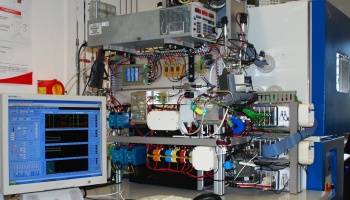
Water-cycle Control Systems Laboratory
The aim of this laboratory is to test and validate modelling and control developments for dynamic systems associated to the water cycle. Hence, it provides platforms of pressure, flow and level processes, over which it is possible to implement real-time advanced control strategies. This laboratory is also open to offer services to other teams in the research community.
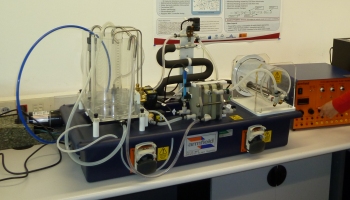

Researchers
-
Blesa Izquierdo, Joaquim
 jblesa (at) iri.upc.edu
jblesa (at) iri.upc.edu
-
Cembrano Gennari, Gabriela
 cembrano (at) iri.upc.edu
cembrano (at) iri.upc.edu
-
Costa Castelló, Ramon
 rcosta (at) iri.upc.edu
rcosta (at) iri.upc.edu
-
Fang, Xin
 xfang (at) iri.upc.edu
xfang (at) iri.upc.edu
-
Ocampo Martínez, Carlos A.
 cocampo (at) iri.upc.edu
cocampo (at) iri.upc.edu
-
Puig Cayuela, Vicenç
 vpuig (at) iri.upc.edu
vpuig (at) iri.upc.edu
-
Romero Ben, Luis
 lromero (at) iri.upc.edu
lromero (at) iri.upc.edu
-
Segovia Castillo, Pau
 psegovia (at) iri.upc.edu
psegovia (at) iri.upc.edu
-
Serra Prat, Maria
 maserra (at) iri.upc.edu
maserra (at) iri.upc.edu
-
Tornil Sin, Sebastian
 stornil (at) iri.upc.edu
stornil (at) iri.upc.edu
PhD Students
-
Arcila Osorio, Mateo
 marcila (at) iri.upc.edu
marcila (at) iri.upc.edu
-
Arenas Angulo, Vanessa Inés
 varenas (at) iri.upc.edu
varenas (at) iri.upc.edu
-
Cardona Rubio, Pol
 pcardona (at) iri.upc.edu
pcardona (at) iri.upc.edu
-
Carrizosa Rendón, Álvaro
 acarrizosa (at) iri.upc.edu
acarrizosa (at) iri.upc.edu
-
Chen, Mingrui
 cmingrui (at) iri.upc.edu
cmingrui (at) iri.upc.edu
-
Marti Florences, Miquel
 mmartif (at) iri.upc.edu
mmartif (at) iri.upc.edu
-
Sabamehr, Milad
 msabamehr (at) iri.upc.edu
msabamehr (at) iri.upc.edu
-
Serrano Moncada, Fernando Emanuel
 fserrano (at) iri.upc.edu
fserrano (at) iri.upc.edu
-
Shan, Anqi
 ashan (at) iri.upc.edu
ashan (at) iri.upc.edu
-
Zhang, Jiahui
 jzhang (at) iri.upc.edu
jzhang (at) iri.upc.edu
Master Students
-
Caballé Benavent, Josep
 jcaballe (at) iri.upc.edu
jcaballe (at) iri.upc.edu
Support Staff
-
Escachx Estevez, Bryan
 bescachx (at) iri.upc.edu
bescachx (at) iri.upc.edu
-
Puleston, Thomas Paul
 tpuleston (at) iri.upc.edu
tpuleston (at) iri.upc.edu

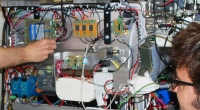










Follow us!